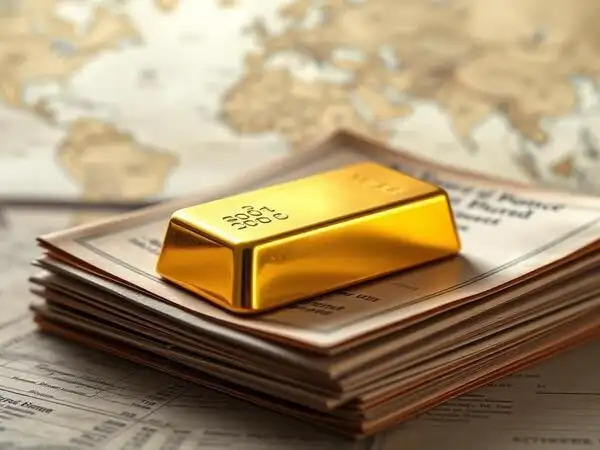As global markets keenly await the outcome of renewed trade negotiations between the United States and China, investors and consumers in the United Arab Emirates (UAE) are closely watching one key indicator: gold prices. With gold being both a revered commodity for personal investment and an essential part of UAE’s cultural fabric, any change in its global value can have a ripple effect across the country’s retail and investment landscapes.
Currently, market analysts are divided on how the conclusion of a potential trade agreement between the two economic giants might impact gold prices in the UAE. However, early trends and global financial signals suggest that a finalized trade deal would likely cause a short-term dip in gold prices—before any long-term realignments come into play.
The Role of Gold as a Safe Haven
Gold has historically been considered a “safe haven” asset. When global uncertainty is high—be it from war, inflation, recession fears, or trade conflicts—investors often flock to gold. It offers the perception of safety and value preservation when currencies and stock markets become unstable.

The prolonged trade tensions between the United States and China, the world’s two largest economies, had significantly fueled this “flight to safety,” contributing to higher gold prices. Investors moved assets from volatile equities to gold, pushing global and UAE prices upward.
However, the latest developments in the ongoing talks indicate that both sides are moving toward a resolution. If an agreement is signed this week, it could diminish one of the major catalysts driving gold prices higher.

Positive US-China Signals Shift Market Sentiment
In recent days, the US Treasury Secretary and the Chinese Vice Premier described their discussions as “constructive” and announced plans to implement an ongoing economic dialogue mechanism. This announcement was welcomed by international markets, with equity indices rising and safe-haven demand softening.
Spot gold prices quickly reacted. On Monday, gold dipped by 1.4% to $3,277.34 per ounce, while US gold futures fell by 1.9% to $3,281.70. The precious metal’s downward trend underscores how market sentiment can rapidly shift when political risk diminishes.
In the UAE, this global movement is mirrored almost instantly due to the country’s robust trading connections and its status as a global gold hub. Retailers in Dubai, Abu Dhabi, and Sharjah have already adjusted prices in response to the international dip.
The Dollar Effect
One crucial side effect of progress in US-China relations is the strengthening of the US dollar. As confidence in the American economy grows, the dollar usually appreciates in value. This appreciation has a direct impact on gold because the metal is priced in dollars globally.
A stronger dollar makes gold more expensive for buyers holding other currencies, reducing its overall demand and pushing prices lower. This dynamic has been playing out over the past few days, with the dollar gaining strength against major currencies like the yen and euro.
For UAE residents and expats who earn in dirhams (which is pegged to the US dollar), this is an interesting phenomenon. While the dollar’s rise reduces gold’s global appeal, it means that buyers in the UAE don’t feel the currency pressure faced by people in other parts of the world. This potentially makes now a more affordable moment to invest in gold within the Emirates.
Regional Stability Adds to Price Decline
In addition to easing trade tensions, geopolitical shifts in South Asia are also contributing to falling gold prices. A US-brokered ceasefire between India and Pakistan appears to be holding, reducing fears of escalation in the region. In the past, any increase in cross-border tensions would typically boost gold prices due to increased risk.
With this new geopolitical stability, the urgency to invest in gold as a protective hedge has waned further, adding to downward price pressure globally.
What This Means for UAE Consumers and Investors
The UAE’s gold market is vibrant, driven by both domestic demand and international tourists. The falling price of gold—especially in a strong dollar environment—may be perceived as an opportunity for many.
Retailers across the UAE are already preparing for an uptick in gold purchases. Several jewelry stores are promoting offers and price alerts, enticing buyers to act before prices rebound. For individuals planning to buy gold jewelry, bullion, or coins, this could be an advantageous moment.
From an investment perspective, financial advisors suggest caution. While the short-term outlook seems to suggest softer prices, the long-term trajectory of gold depends on broader macroeconomic factors including inflation, interest rates, and geopolitical tensions.
Gold has historically delivered consistent returns over time, and its role in portfolio diversification cannot be understated. UAE-based investors are advised to monitor both global events and domestic pricing before making bulk purchases.
Scenarios to Watch
1. Trade Deal Finalized with Strong Commitments:
If the US and China sign a comprehensive trade agreement, market volatility is expected to decrease. This would likely push gold prices lower in the short run as investor anxiety subsides. For UAE residents, this could mean cheaper prices at retail outlets in Deira Gold Souk or The Dubai Mall.
2. Partial Agreement or Delay:
Should the agreement turn out to be partial, vague, or delayed again, uncertainty would return to markets. In such a scenario, gold might rebound quickly. Prices in the UAE could rise sharply in anticipation of renewed global demand.
3. Surprise Escalation in Tensions:
Although unlikely at this point, a sudden breakdown in talks or unforeseen global instability—such as renewed tensions in the Middle East or new sanctions—could push gold prices upward dramatically. For UAE investors, this scenario reemphasizes the value of gold as a long-term hedge.
Cultural Context and Buying Trends in the UAE
Gold in the UAE is not merely an investment; it is a part of life. From weddings to festivals to business gifting, gold plays a central cultural role. This means that price movements influence not just investors, but everyday consumers.
During periods of lower prices, footfall in gold shops increases, especially among South Asian expat communities who traditionally buy during auspicious dates or for remittances. UAE’s expat population—comprising over 80% of its residents—often sends gold jewelry and coins back home as part of traditional gifting practices.
Retailers anticipate that if prices remain subdued due to a trade deal, May and June could see a spike in demand before the Eid season.
Should You Buy Now?
The key question many are asking is: “Should I buy gold now, or wait?”
If you are buying gold for cultural or gifting reasons, now might be an excellent time. Prices have dipped, the dirham is strong, and retailers are offering attractive deals. For long-term investors, this could also be an ideal entry point—provided you understand that gold’s value might continue to fluctuate in the short term.
On the other hand, if you’re speculating for quick profit, it might be wise to wait and see the final terms of the trade deal. Any perceived weakness in the agreement could cause gold to rebound sharply.
Final Word
The potential trade deal between the US and China is poised to reshape global financial markets—and gold is no exception. For the UAE, the implications are clear: a short-term drop in prices is already underway, and further decline could continue if a comprehensive agreement is signed.
Whether you’re a casual buyer looking for a beautiful piece of jewelry, or an investor eyeing portfolio diversification, staying informed is your greatest asset. In a world shaped by complex geopolitics and shifting economic alliances, gold remains both a mirror of global sentiment and a timeless store of value. For UAE residents, it’s the perfect time to weigh your options—and perhaps your gold.
Do follow Uae stories for more Updates
Power Push for Local: UAE Retailers Back Homegrown Products with Bold May Initiative














